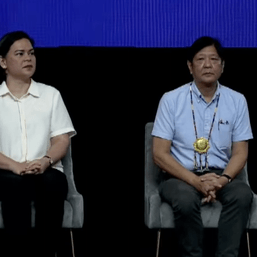SUMMARY
This is AI generated summarization, which may have errors. For context, always refer to the full article.
![[In This Economy] Part 2 | POGOnomics: Are we banning POGOs out of fear, outrage, not rational thought?](https://www.rappler.com/tachyon/2024/06/thought-leaders-pogonomics-part-2b.jpg)
Second of 2 parts
[In This Economy] Part 1 | POGOnomics: Weighing the costs and benefits of POGOs
Last week we revisited the benefits and costs of POGOs since they first flourished under the Duterte administration. And we mentioned that as far as the economic managers are concerned, the costs outweigh the benefits.
NEDA Secretary Arsenio Balisacan, for instance, is persuading President Ferdinand Marcos Jr. to ban POGOs outright. Balisacan said, “We don’t think that the benefits in terms of the revenues generated and the additional…and the impact [on] the economy are worth the cost.” He added, “What we want to encourage are very…legitimate investments, good investments, quality investments.”
Former finance secretary Benjamin Diokno also previously supported a ban on POGOs, because of their social and reputational costs. He said in June 2023, “Let’s get rid of POGOs. We can get revenues from lots of other sources.”
The tricky thing, of course, is that while the economic benefits of POGO are quantifiable, the social costs are much harder (if not nearly impossible) to quantify. Like, how can we measure the ill repute we gain by harboring POGOs?
The illegal activities caused by POGOs are also inherently illicit; we can only make educated guesses about their true extent.
This dilemma was pointed out in Senate hearings in 2022. Senator Chiz Escudero, for example, quizzed the NEDA and Department of Finance officials: “How did you compute social cost? At what point should we be earning, for example, from POGOs for you to say the benefits will overcome the social costs; and how did you come up with the figure on social costs being far weightier than the income or revenue derived by government or the country? Can you put a figure to it?”
When the representatives could not provide solid answers, Escudero added, “So where is it based? If it’s not based on figures, where is it based? Interviews? Surveys? Perception? Emotion? Fear?”
I remember reading from Freakonomics, a popular economics book published back in 2005, a simple yet powerful formula: “risk = hazard + outrage.” This means that the perceived risk from an event can be thought of as the combination of that event’s actual hazard and the outrage it generates.
That is why humans tend to exaggerate the risks from shark attacks and airplane crashes – exceedingly rare but traumatic events, and the trauma they cause makes them more fearsome than warranted.
I think something similar might be going on with the POGO controversies of late. To what extent are we overinflating the risks from POGOs? To what extent are the risks from POGOs overinflated by Filipinos’ historically racist attitudes toward Chinese mainlanders?
Of course, I’d be the last to condone the crimes proven to be linked to some POGO operations. But Senator Escudero made a valid point that other tolerated forms gambling generate crimes, too, from prostitution to kidnapping – remember the sudden disappearance of sabungeros (cockfighting enthusiasts) from 2021 to 2022? Because of this, Escudero suggested that we might as well ban all forms of gambling!
Having said that, though, I have a hunch that each dollar spent on usual forms of gambling generates fewer crimes than each dollar spent on POGOs. Maybe this is the better way of couching the social costs of POGOs. Exactly how many torture chambers and secret tunnels have been linked to e-sabong operations or the glinting golden casinos along Manila Bay?
Escudero added that if we ban POGOs altogether, we will lose a lot of revenues, and this could mean higher taxes.
This is a bit of a stretch. In 2022, we collected just P8.8 billion from POGOs. To put that in perspective, the unpaid estate taxes of the Marcoses amount to at least P203 billion (or 25 times more than the POGO revenues).
How Filipinos share the blame
Remember that POGOs receive provisional licenses from Pagcor. But how exactly does Pagcor vet incoming POGOs? The government needs to overhaul Pagcor’s approval processes.
More crucially, we should also be asking: To what extent are POGO-related crimes enabled by Philippine law-enforcement agents themselves?
On June 6, it was reported that 157 foreigners left the premises of a POGO hub in Porac, Pampanga just before authorities came to visit. Authorities suspect they were tipped off by police. Shortly before that, all 50 members of Bamban’s police force were sacked amid the Alice Guo scandal.
In the case of Bamban, POGO flourished largely because the mayor herself gave permits for POGOs to do business there. Heck, the very land of the POGO hub was previously hers.
But I’m just wondering: How many other POGOs nationwide (and the criminal activities they did) have been allowed right under the noses (and in fact under the protection) of Filipino politicians and police? And did POGOs gravitate to the Philippines precisely because they knew that our officials are easily corruptible?
Remember that POGOs flourished in the Philippines just as Filipinos turned a blind eye to the tens of thousands of Filipinos killed during the Duterte administration’s war on drugs. That they happened at roughly the same time is no coincidence. – Rappler.com
JC Punongbayan, PhD is an assistant professor at the UP School of Economics and the author of False Nostalgia: The Marcos “Golden Age” Myths and How to Debunk Them. In 2024, he was given The Outstanding Young Men (TOYM) Award for economics. JC’s views are independent of his affiliations. Follow him on Twitter/X (@jcpunongbayan) and Usapang Econ Podcast.
1 comment
How does this make you feel?
![[In This Economy] Marcos’ POGO ban is popular, but will it work?](https://www.rappler.com/tachyon/2024/07/thought-leaders-marcos-pogo-ban.jpg?resize=257%2C257&crop=255px%2C0px%2C720px%2C720px)
![[Rappler Investigates] POGOs no-go as Typhoon Carina exits](https://www.rappler.com/tachyon/2024/07/newsletter-graphics-carina-pogo.jpg?resize=257%2C257&crop=424px%2C0px%2C1080px%2C1080px)




![[In This Economy] POGOnomics: Weighing the costs and benefits of POGOs](https://www.rappler.com/tachyon/2024/06/thought-leaders-pogonomics-part-1.jpg?resize=257%2C257&crop=279px%2C0px%2C720px%2C720px)
![[In This Economy] Is the Philippine economy stable?](https://www.rappler.com/tachyon/2024/05/philippine-economy-stable-may-10-2024.jpg?resize=257%2C257&crop=461px%2C0px%2C1080px%2C1080px)


![[Vantage Point] China’s silent invasion of the Philippines](https://www.rappler.com/tachyon/2024/07/TL-china-silent-invasion-july-16-2024.jpg?resize=257%2C257&crop=318px%2C0px%2C720px%2C720px)

![[EDITORIAL] Ang ‘deep, deadly web’ ng POGOs](https://www.rappler.com/tachyon/2024/07/animated-pogos-chinese-crime-syndicate-carousel.jpg?resize=257%2C257&crop=280px%2C0px%2C720px%2C720px)
![[EDITORIAL] Apat na taon na lang Ginoong Marcos, ‘di na puwede ang papetiks-petiks](https://www.rappler.com/tachyon/2024/07/animated-bongbong-marcos-2024-sona-day-carousel.jpg?resize=257%2C257&crop=280px%2C0px%2C720px%2C720px)
![[In This Economy] Delulunomics: Kailan magiging upper-middle income country ang Pilipinas?](https://www.rappler.com/tachyon/2024/07/in-this-economy-upper-middle-income-country.jpg?resize=257%2C257&crop=421px%2C0px%2C1080px%2C1080px)

![[EDITORIAL] Marcos Year 2: Hilong-talilong](https://www.rappler.com/tachyon/2024/07/animated-bongbong-marcos-2nd-sona-carousel.jpg?resize=257%2C257&crop=136px%2C0px%2C720px%2C720px)
![[Newspoint] A fighting presence](https://www.rappler.com/tachyon/2024/07/thought-leaders-a-fighting-presence.jpg?resize=257%2C257&crop=441px%2C0px%2C1080px%2C1080px)
Our politicians are preparing for the 2025 and 2028 elections, and POGOs are crucial sources of campaign funds; hence, they are expected to stay. Unless they make the mistake of going against Speaker Romualdez as SMNI did, POGOs will be with us for a long time as IGLs.